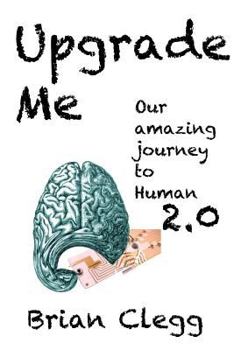Upgrade Me: Our amazing journey to human 2.0
Select Format
Select Condition 
Book Overview
In biological terms human beings haven't evolved in 100,000 years - but thanks to our amazing brains, we are able to upgrade ourselves to add capabilities that have taken other creatures millions of years to evolve. Thanks to this 'unnatural' evolution, we are already Human 2.0.In an effort to live longer, become more attractive to the opposite sex, be better able to defend ourselves, make the most of our brains, repair damaged bodies, we have transformed ourselves.To do this, we have done many things: created artificial skin in the form of clothing, for instance. In the future we will clone human organs for transplants, and use nanotechnology to provide support for failing functions in the human body.Now, with a better understanding of the mechanisms of the body, cloning, gene therapy, bionics and other technologies, the rate at which we are changing is becoming ever faster. This process of upgrading is nothing new. It has been around for millennia, and it raises some challenging questions, such as: -What will the future hold for us-Will our drive to upgrade continue to give positive benefits or will it result in the destruction of humanity?-Where is our evolutionary survival headed?Sure to cause much debate, Upgrade Me is science writer Brian Clegg's ambitious and brilliant account of humanity's need to upgrade.
Format:Paperback
Language:English
ISBN:1717981666
ISBN13:9781717981660
Release Date:November 2008
Publisher:Independently Published
Length:210 Pages
Weight:0.69 lbs.
Dimensions:0.5" x 6.0" x 9.0"
Customer Reviews
1 rating
All technology is an attempt to transcend human nature, we may succeed in the end, for good
Published by Thriftbooks.com User , 15 years ago
This is a very good read on why human enhancement has been good for us and why we should continue to enhance ourselves. Although the subtitle of the book is "Our Amazing Journey to Human 2.0," the first two-thirds of the book is a look back in history. It explains in detail the central point that all technology is an attempt to transcend human nature. We have been enhancing ourselves since the beginning - the first woven garment, for example, appeared as early as 25,000 B.C. From wearing eyeglasses to drinking coffee, once a new technology has proven to work and become affordable, we all love to embrace it and gradually take it for granted. The big difference today is emerging new technologies are not just providing add-ons and networking capabilities to the human body, but also approaching the threathold of modifying the core of human nature. So the rest of the book effectively addresses various concerns about changing ourselves. Will cognitive enhancement make us dumber somehow? No, the author points out that "When the slide rules were replaced by the calculators, everyone said the next generation won't understand math the same way - it didn't happen. When computers came along, many predicted that learning as we know it would collapse. It didn't." Will genetic tinkering lead to catastrophe? Not necessarily. In fact, commenting on Mary Shelley's Frankenstein story, Clegg said, "Biologically speaking, every one of us is a particular kind of monster - a mutant." (more details on blog www.2CoBe.com) The book ends with a healthy dose of realism: "It would be foolish to portray our ability to enhance ourselves as wholly positive." Risk is unavoidable, though it can be managed with our conscious efforts.






